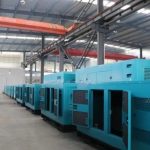Introduction:
In today's fast-paced world, where uninterrupted power supply is crucial for both residential and commercial settings, diesel generators have emerged as a reliable and efficient solution for backup power needs. Diesel generators are known for their robustness, durability, and ability to provide continuous power during outages or emergencies. This article aims to provide a comprehensive guide to diesel generators, exploring their working principle, advantages, applications, maintenance, and factors to consider when choosing a diesel generator for backup power needs.
1. Working Principle of Diesel Generators:
Diesel generators operate on the principle of converting diesel fuel into mechanical energy, which is then converted into electrical energy through an alternator. The basic components of a diesel generator include the diesel engine, alternator, fuel system, cooling system, and control panel.
When the diesel generator is started, the diesel engine ignites the diesel fuel in the combustion chamber, causing the pistons to move and generate mechanical energy. This mechanical energy is then transferred to the alternator, which converts it into electrical energy through electromagnetic induction. The generated electricity is then distributed to the connected loads through the output terminals of the generator.
2. Advantages of Diesel Generators for Backup Power:
- Reliability: Diesel generators are known for their reliability and ability to provide continuous power for extended periods. They are suitable for critical applications where uninterrupted power supply is essential.
- 200kw diesel generator : Diesel generators are built to withstand harsh environmental conditions and heavy usage. They have a longer lifespan compared to other types of generators, making them a cost-effective choice for backup power needs.
- Fuel Efficiency: Diesel engines are more fuel-efficient than gasoline engines, providing more power output per unit of fuel consumed. This results in lower operating costs and reduced fuel consumption over time.
- Easy Maintenance: Diesel generators require regular maintenance to ensure optimal performance. However, they are relatively easy to maintain compared to other types of generators, with fewer moving parts and simpler maintenance procedures.
- Quick Start-up Time: Diesel generators can start up quickly and provide power within seconds of an outage, ensuring minimal downtime for connected loads.
3. Applications of Diesel Generators:
Diesel generators find a wide range of applications in various sectors and settings, including:
- Residential: Diesel generators are commonly used in residential settings to provide backup power for essential appliances, lighting, and heating systems during power outages.

- Commercial: In commercial settings such as office buildings, hospitals, data centers, and manufacturing facilities, diesel generators are used to ensure continuous power supply for critical operations and equipment.
- Construction: Diesel generators are indispensable on construction sites where grid power may not be available. They power construction equipment, tools, and temporary facilities on site.
- Telecommunications: Telecommunication towers and networks rely on diesel generators for backup power to maintain communication services during emergencies or natural disasters.
- Agriculture: Diesel generators are used in agricultural settings to power irrigation systems, farm equipment, and livestock operations, ensuring uninterrupted operation and productivity.
4. Maintenance of Diesel Generators:
Proper maintenance is essential to ensure the reliable performance and longevity of diesel generators. Some key maintenance tasks include:
- Regular Inspections: Conduct routine inspections of the generator, including checking for leaks, loose connections, and signs of wear and tear.
- Fuel Management: Ensure that the diesel fuel is clean, free from contaminants, and stored properly to prevent fuel degradation.
- Oil and Filter Changes: Regularly change the engine oil and filters according to the manufacturer's recommendations to prevent engine damage and maintain optimal performance.
- Cooling System Maintenance: Check the coolant levels, hoses, and radiator for leaks or blockages, and ensure proper functioning of the cooling system to prevent overheating.
- Battery Maintenance: Inspect the batteries for corrosion, ensure proper electrolyte levels, and test the battery's performance regularly to avoid starting issues.
5. Factors to Consider When Choosing a Diesel Generator:
When selecting a diesel generator for backup power needs, several factors need to be considered to ensure the generator meets the specific requirements of the application. Some key factors to consider include:
- Power Output: Determine the power requirements of the connected loads to select a diesel generator with the appropriate power output capacity.
- Fuel Efficiency: Consider the fuel consumption rate and efficiency of the diesel generator to minimize operating costs over the generator's lifespan.
- Noise Level: Evaluate the noise levels produced by the generator to ensure compliance with local regulations and minimize disturbances in residential or commercial settings.
- Emissions: Check the emissions standards and regulations in your area to select a diesel generator that meets environmental requirements and reduces air pollution.
- Portability: Consider the portability and mobility of the generator, especially for applications that require frequent relocation or temporary power solutions.
- Budget: Evaluate the initial cost, operating expenses, and maintenance requirements of the diesel generator to determine the overall cost-effectiveness of the investment.
Conclusion:
Diesel generators play a vital role in providing backup power for a wide range of applications, ensuring uninterrupted operation and productivity during outages or emergencies. Their reliability, durability, fuel efficiency, and ease of maintenance make them a popular choice for residential, commercial, industrial, and agricultural settings. By understanding the working principle, advantages, applications, maintenance, and key factors to consider when choosing a diesel generator, users can make informed decisions to meet their backup power needs effectively and efficiently.
